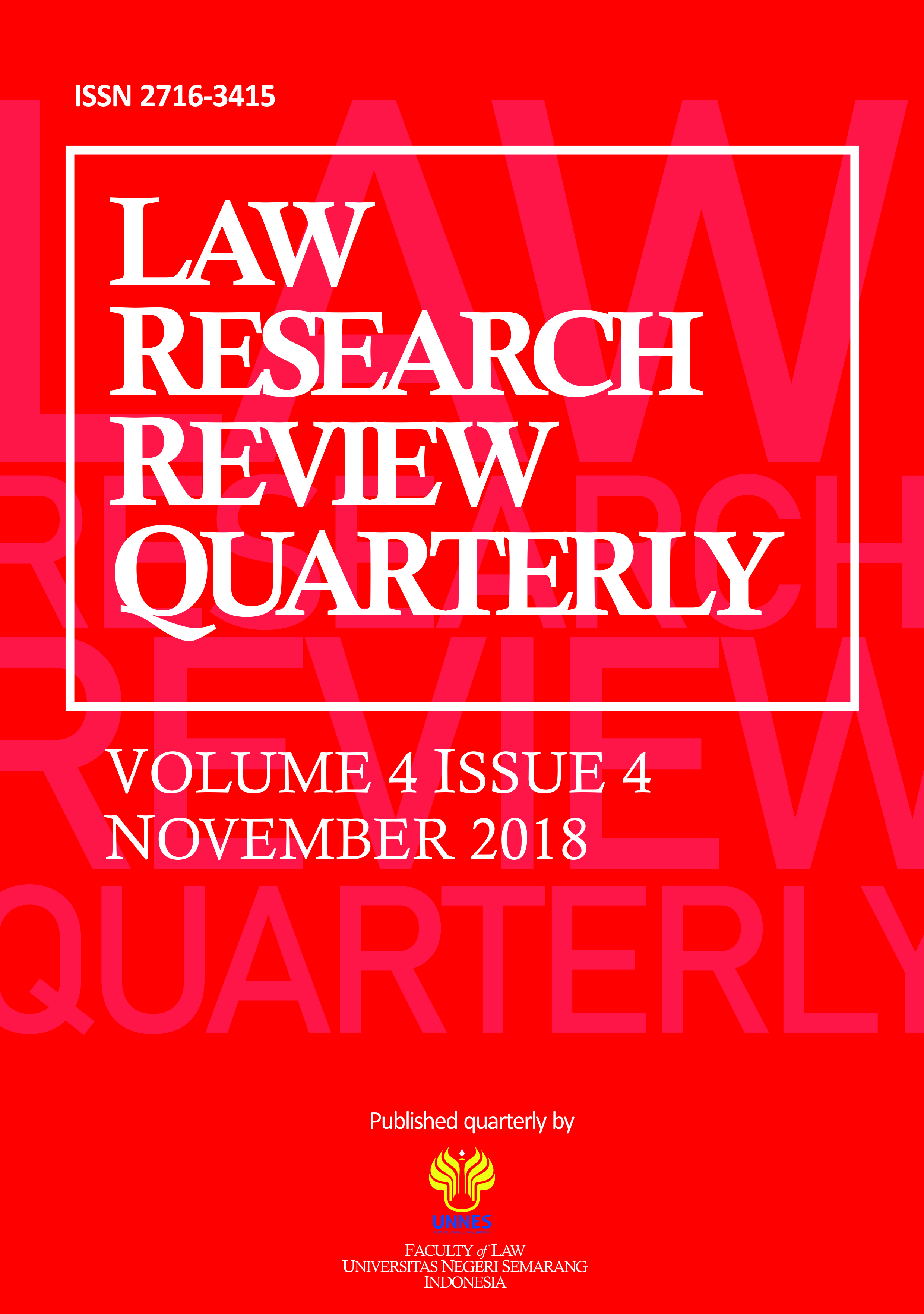Television Media Ownership as a Political Communication Tool in the Election
Main Article Content
Abstract
Media as a pillar in democracy as well as a medium of public information has an influence on the formation of public opinion. In the context of elections, one of the media in political communication that has the greatest influence on voter choice is television. In principle, television media uses the frequency of society, then the public has the right to get balanced coverage. However, media owners who are part of electoral contestation use media as a communication media that abuses the media by broadcasting unequal news. The purpose of this study is to examine the use of television media as a means of political communication with media ownership, secondly, analyze various matters relating to television media ahead of the election. This research is a normative research that is based on basic and secondary materials, which are the rules and literature relevant to the object of research. Primary and secondary legal materials are obtained through library studies. The analysis used in this study is descriptive qualitative. The results showed that there was a linear relationship between media ownership of media owners in using their television media as a means of political communication. Regulations for using media in using media are used as personal communication tools in the Broadcasting Law, P3SPS, and General Election Commission Regulations. These regulations that maintain the media remain as a public information media that prioritizes the public and avoids various media in elections, although it is still needed for television media to remain neutral.
Article Details
All writings published in this journal are personal views of the authors and do not represent the views of this journal and the author's affiliated institutions. Author(s) are retain the copyrights of the Article. However, before publishing, it is required to obtain written confirmation from Author(s) in order to ensure the originality (Author Statement of Originality). The statement is to be signed by at least one of the authors who have obtained the assent of the co-author(s) where applicable.This work licensed under a Creative Commons Attribution-ShareAlike 4.0 International (CC BY-SA 4.0)
References
Baksin dkk. (2006). Jurnalistik Televisi : Teori dan Praktik. Bandung: Simbiosa Rekatama Media.
Dan Nimmo. (2007). Political Communication and Public Opinion in America (Komunikasi Politik: Komunikator, Pesan, dan Media), Terjemahan Tjun Surjaman. Bandung: Remaja Rosda Karya.
Dewan Pers. (2014). Jurnal Dewan Pers : Mengungkap Independensi Media. Jakarta: Dewan Pers
D. Dwita. (2014). Televisi dan Kepentingan Pemilik Modal dalam Perspektif Teori Ekonomi Politik Media. Riau: Artikel Konseptual.
Hafled Cengara. (2009). Komunikasi Politik. Jakarta. Rajawali Pers
Morissan. (2010). Teori Komunikasi Massa: Media, Budaya, dan Masyarakatâ€. Bogor: Ghalia Indonesia
Shoemaker dkk. (1996). Mediating The Message. New York: Longman Publisher.
Stanley J. Baran & Dennis K. Davis. (2000). Mass Communication Theory: Foundation, Ferment, and Future ed. 2nd, USA: Wadsworth
Jurnal
Anggia Valerisha. (2016). "Dampak Praktik Konglomerasi Media Terhadap Pencapaian Konsolidasi Demokrasi di Indonesia", Jurnal Ilmiah Hubungan Internasional, Vol 12 No 1.
Berliana Ardha. (2014). "Social Media sebagai Media Kampanye Partai Politik 2014", Jurnal Visi Komunikasi, Vol 13 No 01.
Jaduk Gilang Pembayun. (2015). "Konglomerasi Media dan Dampaknya Pada Pilpres 2014", Jurnal Interaksi. Vol 4 No. 2.
Karman. (2014). "Monopoli Kepemilikan Meia dan Lenyapnya Hak Publik". Jurnal Masyarakat Telematika dan Informasi, Vol. 5 No. 1.
Lydia Rosalia. (2014). "Konglomerat Media Sebagai Elit Politik: Wacana Dalam Pemberitaan Hary Tanoesodibjo di Koran Sindo", Jurnal E-Komunikasi ,Vol 2 No 1.
Marnia Rani. (2014). "Peran Lembaga Penyiaran Televisi dalam Kampanye Pemilihan Umum Presiden dan Wakil Presiden", Jurnal Selat, Vol 1 No 2.
Sumarsono Soemardjo. (2014). "Peran Televisi Dalam Meningkatkan Partisipasi Politik Masyarakat Pada Pemilu Presiden 2014 (Kasus di Desa Landungsari Malang)", Jurnal Penelitian dan Pengembangan Komunikasi dan Informatika, Vol 5 No 3
Peraturan Perundang-Undangan
Undang-Undang Nomor 32 Tahun 2002 tentang Penyiaran
Peraturan Komisi Penyiaran Indonesia Nomor 01/P/KPI/03/2012 tentang Pedoman Perilaku Penyiaran
Peraturan Komisi Penyiaran Indonesia Nomor 02/P/KPI/03/2012 tentang Standar Program Siaran
Makalah Seminar / Lokakarya / Talkshow / Saresehan
Catrina. (2014). Pengaruh Orientasi Politik Media terhadap Pemberitaan Televisi. Makalah Non-Seminar Universitas Indonesia Departemen Ilmu Komunikasi.
Tuti Widiastuti. (2016). Kepemilikan Media dan Demokrasi di era Digital Information Age, Prosiding Seminar Nasional INDOCOMPAC, Universitas Bakrie, Jakarta 2-3 Mei 2016
Data Elektronik
Remotivi. Independensi Televisi Menjelang Pemilu 2014 : Ketika Media Jadi Corong Kepentingan Politik Pemilik. http://www.remotivi.or.id/download/Resource/dc6b1fe5d011f276f27a89008740e606.pdf/Independensi%20Televisi%20Menjelang%20Pemilu%202014%20(Bagian%20I) diakses pada (5 November 2018, Pukul 12.00 WIB)
